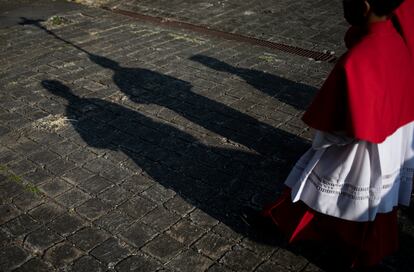Vatican closes embassy in Nicaragua after Ortega’s crackdown
The Vatican’s representative to Managua, Monsignor Marcel Diouf, also left the country Friday, bound for Costa Rica

The Vatican said Saturday it had closed its embassy in Nicaragua after the country’s government proposed suspending diplomatic relations, the latest episode in a yearslong crackdown on the Catholic Church by the administration of Nicaraguan President Daniel Ortega.
The Vatican’s representative to Managua, Monsignor Marcel Diouf, also left the country Friday, bound for Costa Rica, a Vatican official said, speaking on condition of anonymity.
The Vatican action came a week after the Nicaraguan government proposed suspending relations with the Holy See, and a year after Nicaragua forced the papal ambassador at the time to leave. It’s not clear what more the proposed suspension would entail in diplomatic terms.
Relations between the church and Ortega’s government have been deteriorating since 2018, when Nicaraguan authorities violently repressed anti-government protests.
Some Catholic leaders gave protesters shelter in their churches, and the church later tried to act as a mediator between the government and the political opposition.
Ortega branded Catholic figures he saw as sympathetic to the opposition as “terrorists” who had backed efforts to overthrow him. Dozens of religious figures were arrested or fled the country.
Two congregations of nuns, including from the Missionaries of Charity order founded by Mother Teresa, were expelled from Nicaragua last year.
Prominent Catholic Bishop Rolando Álvarez was sentenced to 26 years in prison last month after he refused to board an airplane that flew 222 dissidents and priests to exile in the United States. He also was stripped of his Nicaraguan citizenship.
Pope Francis had remained largely silent on the issue, apparently not wanting to inflame tensions. But in a March 10 interview with Argentine media outlet Infobae, after Alvarez’s sentencing, he called Ortega’s government a “rude dictatorship” comparable to Hitler’s that was led by an “unbalanced” president.
According to Vatican News, the care of the Vatican’s embassy, or nunciature, was entrusted to the Italian government, according to diplomatic conventions. The report said diplomats of the European Union, Germany, France and Italy gave Diouf, the chargé d’affaires, a farewell salute before he shuttered the diplomatic post and left.
During the farewell ceremony, Germany’s ambassador to Nicaragua, Christoph Bundscherer, expressed regret at the embassy’s closure and asked Diouf to share a message with Pope Francis, according to a statement on the German Embassy’s Facebook page.
“Together with the Catholic Church, the representatives of the European Union in Nicaragua will also always defend the Christian values of freedom, tolerance and human dignity,” Bundscherer said, according to the statement.
The Nicaraguan government, which since September 2018 has banned all opposition demonstrations in the country, also restricted Catholic activities inside churches, including banning the traditional street processions that thousands of Nicaraguans used to celebrate in the lead up to Holy Week and Easter.
The restrictions forced church authorities to hold the Stations of the Cross procession on the grounds of the Metropolitan Cathedral of Managua, as they did Friday.
Sign up for our weekly newsletter to get more English-language news coverage from EL PAÍS USA Edition
Tu suscripción se está usando en otro dispositivo
¿Quieres añadir otro usuario a tu suscripción?
Si continúas leyendo en este dispositivo, no se podrá leer en el otro.
FlechaTu suscripción se está usando en otro dispositivo y solo puedes acceder a EL PAÍS desde un dispositivo a la vez.
Si quieres compartir tu cuenta, cambia tu suscripción a la modalidad Premium, así podrás añadir otro usuario. Cada uno accederá con su propia cuenta de email, lo que os permitirá personalizar vuestra experiencia en EL PAÍS.
¿Tienes una suscripción de empresa? Accede aquí para contratar más cuentas.
En el caso de no saber quién está usando tu cuenta, te recomendamos cambiar tu contraseña aquí.
Si decides continuar compartiendo tu cuenta, este mensaje se mostrará en tu dispositivo y en el de la otra persona que está usando tu cuenta de forma indefinida, afectando a tu experiencia de lectura. Puedes consultar aquí los términos y condiciones de la suscripción digital.








































